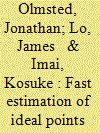| Srl | Item |
| 1 |
ID:
184667


|
|
|
|
|
| Summary/Abstract |
“How long can NATO last in a post-US hegemonic, multipolar world?” has become an important question in contemporary world politics. By statistically analyzing NATO alliance cohesion since its inception, this analysis contributes to the literature by developing an original set of indicators that rely on the ideal point estimates from a recent UN General Assembly voting dataset. It empirically verifies that NATO members have higher cohesion than other UN members, although the United States has been the most significant deviating member since 1980. The findings support some earlier proposals such as the external threat hypothesis. They also contradict some others, notably the literature on the Donald Trump administration’s withdrawal doctrine, and the decline of US hegemony and its policy implications. The article concludes that the future challenge for NATO cohesion not only would be the possibility of US abdication or abandonment, but also other members’ balancing the United States as the hegemon.
|
|
|
|
|
|
|
|
|
|
|
|
|
|
|
|
| 2 |
ID:
149669


|
|
|
|
|
| Summary/Abstract |
Estimation of ideological positions among voters, legislators, and other actors is central to many subfields of political science. Recent applications include large data sets of various types including roll calls, surveys, and textual and social media data. To overcome the resulting computational challenges, we propose fast estimation methods for ideal points with massive data. We derive the expectation-maximization (EM) algorithms to estimate the standard ideal point model with binary, ordinal, and continuous outcome variables. We then extend this methodology to dynamic and hierarchical ideal point models by developing variational EM algorithms for approximate inference. We demonstrate the computational efficiency and scalability of our methodology through a variety of real and simulated data. In cases where a standard Markov chain Monte Carlo algorithm would require several days to compute ideal points, the proposed algorithm can produce essentially identical estimates within minutes. Open-source software is available for implementing the proposed methods.
|
|
|
|
|
|
|
|
|
|
|
|
|
|
|
|